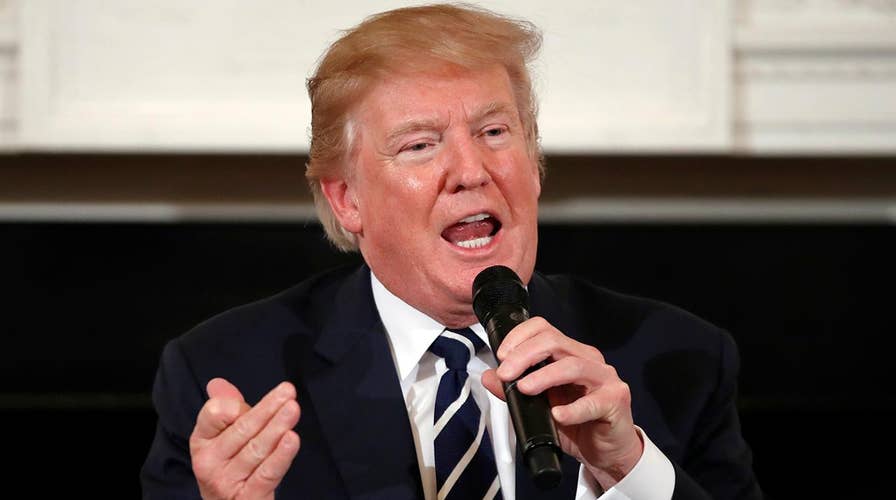President Trump was crystal clear on federal firearms policy this week: Seize weapons from people under certain circumstances without due process and rename a gun bill now before Congress.
The president declared the government should confiscate firearms from some people who may struggle with mental illness.
“I like taking the guns early,” Trump said. “Take the guns first. Go through due process second.”
The president also confidently instructed lawmakers to revise the heading on legislation designed to bolster the National Instant Criminal Background Check System, known as the “Fix NICS” measure.
“Maybe you change the title,” he told them at Wednesday’s White House firearms confab. “The ‘U.S. Background Check Bill,’ or whatever.”
And with that, Trump presented Congress with concrete directions on how to solve the nation’s scourge of gun violence.
It’s now been two-and-a-half weeks since the massacre at Marjory Stoneman Douglas High School, in Parkland, Florida. Yet any action on guns is at least another few weeks away -- if ever.
The Senate leadership can’t forge an agreement to consider any gun bill next week, planning instead to wrestle with a handful of nominations and a banking-reform package.
Saying that Congress is close to debating firearms is like saying the curling competition is about to wrap up at the Winter Olympics.
Sen. Mike Lee, R-Utah, blocked the Senate this week from launching debate on the background checks bill. Many Democrats and some Republicans want to address more than just better background checks. But nobody is sure the chamber can ever reach an accord just to start debate on any firearms legislation.
Congress has faced this crossroads before -- Columbine, Virginia Tech, Aurora, Newtown, Charleston, San Bernardino, Orlando, Las Vegas … .
Lawmakers of both parties have professed that things were “different” after each of those episodes.
Still …
“We’re at a tipping point,” observed Rep. Elizabeth Esty, D-Conn., at the White House meeting. Esty represents Newtown.
Sen. Bob Casey, D-Pa., wasn’t at the meeting and disagreed with Esty’s assessment.
“I’m not sure this will be a tipping point,” he said. “But it’s my sense that the ground has moved. Maybe ever so slightly. But at least enough that politicians can’t run and hide on this.”
So just how seismic was the attack at Parkland? Did the tectonic political plates really shift to compel legislative movement? How seismic were any of the other mass shootings? They certainly seemed to be seismic.
But none evoked a c ongressional response. In other words, the other mass shootings were just fissures. Despite astonishing events, perhaps the “big one” really hasn’t hit yet on guns. A gun attack so violent that it will tear apart the San Andreas Fault on this issue and force action.
A number of Senate Republicans tell Fox their conference is divided on what to do, if anything at all. Fox is told there is one wing of Republicans that just wants to do “something.” Members of that wing fear voters will torch them if they don’t move. At the White House meeting, Trump admonished congressional Republicans for being “petrified” of the NRA.
“I think you underestimate the power of the gun lobby,” shot back Sen. Chris Murphy, D-Conn.
And that’s the problem for the GOP. Democrats like Murphy have long experienced the NRA. But Republicans aren’t used to incurring the NRA’s wrath.
What looms is how Trump led another summit earlier this winter on immigration and DACA – then reversed course.
“Is this the Tuesday Trump or the Thursday Trump?” asked Sen. Jeff Flake, R-Ariz., of the gun convocation. “It’s a Wednesday, so we don’t know.”
“If the president has another one of these sessions and he doesn’t follow through, it’s going to hurt him,” predicted Sen. Lindsey Graham, R-S.C. “It’s going to hurt the Republican Party.”
But what if some Republicans run afoul of Second Amendment advocates? Senate GOP primaries are coming up. Some Republicans could vote for a gun plan which, heretofore, flies in the face of conventional GOP orthodoxy on firearms, and then face a beat-down in their primary.
Look at how GOP Senate hopeful Danny Tarkanian could deploy such approach against Sen. Dean Heller, R-Nevada, or Republican Senate candidate Chris McDaniel against incumbent GOp Mississippi Sen. Roger Wicker.
Some Republicans are privately apoplectic about what the president said about guns at the White House meeting.
“It did more harm than good,” said one Republican congressional source. “If (former President Barack) Obama would have said what (President) Trump said about guns, there would be riots in the streets.”
Right-wing activists warned for years that Obama, Hillary Clinton, California Sen. Dianne Feinstein and a host of other Democrats were coming to “get” people’s guns. The scare tactics inflated the price of firearms and ammo. And then on Wednesday, Trump -- of all people -- said he would seize some guns.
That freaked out congressional Republicans.
“We’re in a really bad place on this,” said one GOP senator who asked to not be identified. “We can’t do anything.”
There’s risk in the gun debate for Democrats, too.
Senate Minority Leader Chuck Schumer, D-N.Y., earlier this week introduced a three-point plan on firearms. Schumer’s scheme includes a debate on assault weapons. But this is a perilous path. A number of vulnerable Senate Democrats face competitive races this year in swing states or territory in which Trump is popular. Taking a tough gun vote could put those Democrats in a jam.
When asked about Schumer’s gambit, one Democratic senator with a challenging race this fall pulled no punches on the minority leader: “He’s stupid,” the senator said.
And don’t forget that Trump says he wants a bunch of proposals shoehorned into a solitary, gargantuan, comprehensive bill.
That rarely works in Washington.
Enter the “Goldilocks” factor: crafting a bill that’s “not too hot, not too cold, but just right.”
Legislation is all about “sweeteners” and “poison pills.” You could coax just enough lawmakers to vote yes on a bill if you add precisely the right sweeteners. Mix in the wrong ingredient, and you have a poison pill that drains support from the legislation.
There’s talk the House and Senate could just move an enhanced background checks measure and nothing else. Well, the House attached the enhanced background checks provision as a “sweetener” to a gun plan last year.
The base bill granted reciprocity for concealed carry permits across state lines -- a priority of the NRA. The House approved the legislation and sent it to the Senate.
Concealed carry reciprocity across state lines won’t command 60 yeas in the Senate to break a filibuster. So, the natural inclination is to strip out the reciprocity provision. Does the bill then automatically score 60 ayes? Unclear. Democrats may demand the Senate do more on guns than just background checks.
Let’s say the Senate does approve a lean background checks measure, sans concealed carry reciprocity.
The Senate then sends the measure back to the House to sync up. The House Freedom Caucus and other conservatives would likely oppose the package because leaders extracted concealed carry reciprocity.
Under conventional circumstances, Democrats could make up the difference created by Republican defectors and vote yes for background checks.
However, there’s a problem. House Democrats might now oppose the legislation because they would demand extras on assault weapons and other gun limitations. The House could struggle to pass the retooled bill.
So, nobody is clear where this is headed -- if it’s headed anywhere at all.
“Votes are hard to get in Congress,” Trump said at the Wednesday session.
Votes are hard on health care, tax reform and even foreign policy. But votes on gun legislation are the hardest of all.
Otherwise, Congress would have dealt with this a long time ago.





